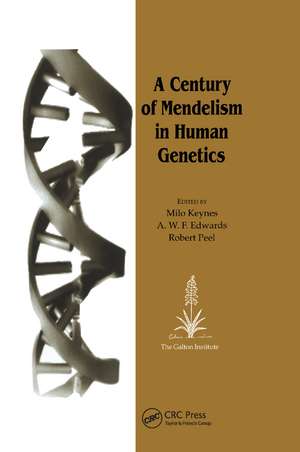A Century of Mendelism in Human Genetics
Editat de Milo Keynes, A. W. F. Edwards, Robert Peelen Limba Engleză Paperback – 23 oct 2019
Besides being of general medical significance, this book will be of particular interest to departments of genetics and of medical genetics, as well as to historians of science and medicine.
Preț: 367.98 lei
Preț vechi: 475.92 lei
-23% Nou
Puncte Express: 552
Preț estimativ în valută:
70.41€ • 73.71$ • 58.26£
70.41€ • 73.71$ • 58.26£
Carte tipărită la comandă
Livrare economică 05-19 aprilie
Preluare comenzi: 021 569.72.76
Specificații
ISBN-13: 9780367394462
ISBN-10: 0367394464
Pagini: 180
Dimensiuni: 156 x 234 x 15 mm
Greutate: 0.33 kg
Ediția:1
Editura: CRC Press
Colecția CRC Press
ISBN-10: 0367394464
Pagini: 180
Dimensiuni: 156 x 234 x 15 mm
Greutate: 0.33 kg
Ediția:1
Editura: CRC Press
Colecția CRC Press
Public țintă
Professional Practice & Development and Professional ReferenceCuprins
Part 1: The First Fifty Years of Mendelism. Part 2: Human Genetics from 1950.
Notă biografică
Milo Keynes, A. W. F. Edwards, Robert Peel
Descriere
A Century of Mendelism in Human Genetics focuses on the impact that Mendelism has had on the study of disease, including human cancer genetics, natural selection in human populations, and genetics in the future of medicine. The authors provide a historical perspective of the first fifty years of Mendelism, including the bitter argument between the Mendelians and the biometricians. They discuss human genetics since 1950, ending with a final chapter examining genetics and the future of medicine. The book considers the genetics of both single-gene and complex diseases, human cancer genetics, genetic linkage, and natural selection in human populations.
